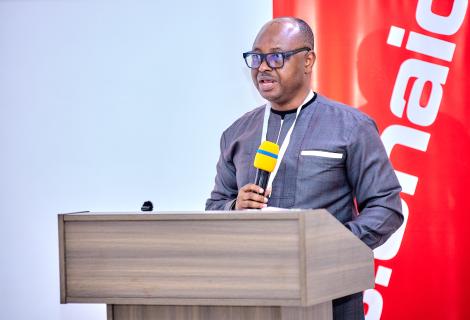ActionAid Ghana Champions Green Transition and Climate Financing in Landmark National Dialogue; Calls for Urgent Reform in Development Finance and Renewable Energy Policy

With Ghana’s development increasingly threatened by climate impacts, debt stress, and energy insecurity, ActionAid Ghana is leading a renewed national push to fix broken financing systems and accelerate a just green transition.
At a high-level national dialogue held on Friday, June 20 at the Tomreik Hotel, ActionAid Ghana convened key stakeholders from civil society, government, development partners, academia, and grassroots movements under the theme:
“Reviewing Development Financing for People and Planet: A Civil Society–Government Dialogue for Systemic Reform.”
The event comes as Ghana grapples with overlapping crises: public debt surpassing 90% of GDP, a shrinking fiscal space for climate investment, and continued underfunding of renewable energy development—just as the nation’s climate vulnerability increases.
ActionAid Ghana: Civil Society Must Lead the Energy Transition
Opening the dialogue, John Nkaw, Country Director of ActionAid Ghana, delivered a strong message:
“The confluence of rising debt, illicit financial flows, reduced donor support, and a narrowing fiscal space demands bold and systemic responses. Civil society must lead—not follow—in co-creating just and sustainable futures,” he said.
“This includes advocating for green energy investments, climate-smart agriculture, and a rethinking of how Ghana funds its development.”
Climate Financing Gap: Green Solutions or Greenwashing?
Panelists raised concerns that Ghana’s climate response remains underfunded, under-prioritized, and over-reliant on external support. According to Denis Gyeyir of the Natural Resource Governance Institute (NRGI), Ghana faces a climate financing need of $9.3 billion to $15.5 billion between 2020 and 2030—yet much of this remains unfunded.
He warned:
- Poor households may lose up to 40% of income by 2050 due to climate shocks.
- 45,000 people are affected by flooding each year.
- The transport sector faces a $3.9 billion infrastructure loss over the next decade.
Stakeholders called for domestic resource mobilisation, climate-sensitive budgeting, and urgent reforms in public spending to reflect climate realities.
Energy Transition: Ghana’s Green Leap Forward?
Dr Robert Bright Mawuko Sogbadji, Deputy Director of Power (Nuclear and Alternative Energy) at the Ministry of Energy, highlighted government efforts to anchor Ghana’s energy system in sustainability.
“The future of energy is green—and Ghana must lead with confidence and clarity. From hydrogen production to carbon credit trading, we have unique opportunities to drive inclusive growth while addressing the climate emergency,” he noted.
Dr. Sogbadji outlined concrete steps Ghana is taking toward a just energy transition:
- Operationalising eight solar-powered mini-grids, with 33 more in development by mid-2025.
- Upgrading the Renewable Energy Unit into a full Directorate for Renewable and Green Transition.
- Creating a Renewable Energy Authority and a Green Transition Fund.
- Partnering with ECOWAS and development actors on green hydrogen production.
- Promoting Compressed Natural Gas (CNG) and electric vehicles by removing import duties on clean transport options.
However, he acknowledged global barriers—such as fossil fuel lobbying, energy geopolitics, and limitations in renewable battery storage.
Agroecology, Not Agro-Dependency
Ghana’s food systems were also under scrutiny. Wilberforce Laate of CIKOD argued that Ghana’s continued investment in synthetic fertilisers and hybrid seed inputs undermines food sovereignty and worsens climate vulnerability.
“Agroecology is a debt-free, climate-resilient alternative that puts farmers back in control. It builds soil health, protects biodiversity, and supports local economies—without increasing our national debt,” he said.
Currently, only 7% of Ghana’s national budget is allocated to agriculture, falling short of the 10% CAADP benchmark.
Innovative Financing: Diaspora Bonds, Blended Capital, and Impact Investing
Charles Vandyck of WACSI proposed innovative funding options to supplement waning aid flows:
- Diaspora bonds to leverage patriotic capital from Ghanaians abroad
- Blended finance to combine public and private investments
- Social impact investing to align capital with sustainable development outcomes
“Borrowing is not sustainable. We must diversify how we finance our future—creatively, equitably, and accountably,” he stressed.
The national dialogue concluded with a unified call for action:
- Substantially increase investment in green energy and agroecology.
- Close the climate financing gap through domestic and international sources.
- Enact progressive tax reforms to curb illicit financial flows and corporate tax abuse.
- Ensure that green investments are inclusive, gender-responsive, and locally owned.
- Empower youth and communities with green skills and just transition policies.
A People-Powered Green Transition
ActionAid Ghana reaffirmed its commitment to social justice, climate resilience, and economic transformation.
“The energy future must belong to the people—not polluters. And climate justice begins with financing justice,” said John Nkaw.
As the country steps into an uncertain climate future, this dialogue represents a powerful step toward charting a sustainable, equitable, and people-powered path forward.
-End-